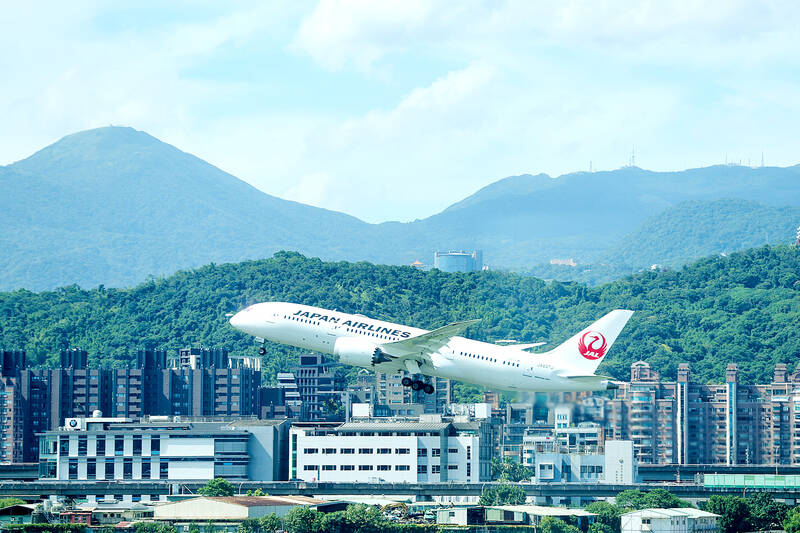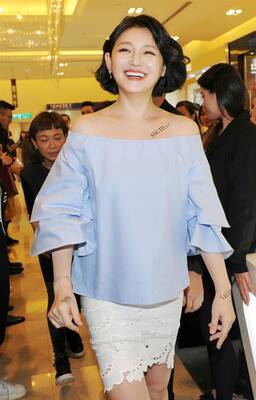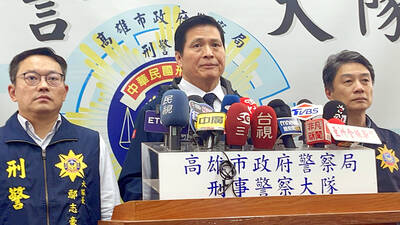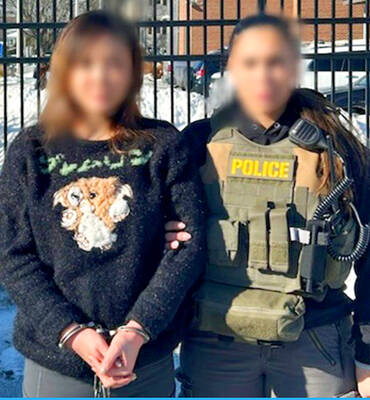Taiwanese travel agencies are looking to partner with Japanese counterparts to promote tours to the East Asian country, after Tokyo on Wednesday eased travel restrictions, the Tourism Bureau has said.
The Japanese government raised the weekly inbound traveler cap from 20,000 to 50,000 and dropped the requirement that tourists arrive in guided tour groups.
The new rules would take effect on Wednesday next week, Japanese Prime Minister Fumio Kishida said.

Photo: CNA
Authorities would release more details soon, Japanese media reported.
While travelers to Japan would not need to be accompanied by a tour guide, they must still follow the itineraries set by travel agencies, media reports said.
The bureau said local travel agencies could sell their customers flight and hotel packages, and put them in touch with Japanese travel agencies, who would take care of them while they are in Japan.
However, traveling to Japan would be more complicated than in the past, as tourists would need Japanese travel agencies to help them purchase insurance plans, and vouch for the purposes of their trips and their health condition to apply for a tourist visa, Chung Hsing Travel Service president Ringo Lee (李奇嶽) said.
The process would likely cost ¥10,000 and ¥15,000 (US$72 to US$108) for a five-to-seven day trip, Lee said.
The number of Taiwanese heading to Japan could rise 30 percent following the easing, he added
Also starting from Wednesday next week, travelers who have received three shots of a COVID-19 vaccine would not need to present the negative result of a polymerase chain reaction test upon boarding flights to Japan.
However, a shortage of flights, rising airfare costs and the month-long wait time for the approval of travel visas could discourage people from traveling to Japan, Lee said.
The daily number of arrivals to Japan was about 14,000 in July and about 20,000 last month, Immigration Services Agency of Japan data showed.

Twenty-four Republican members of the US House of Representatives yesterday introduced a concurrent resolution calling on the US government to abolish the “one China” policy and restore formal diplomatic relations with Taiwan. Led by US representatives Tom Tiffany and Scott Perry, the resolution calls for not only re-establishing formal relations, but also urges the US Trade Representative to negotiate a free-trade agreement (FTA) with Taiwan and for US officials to advocate for Taiwan’s full membership in the UN and other international organizations. In a news release announcing the resolution, Tiffany, who represents a Wisconsin district, called the “one China” policy “outdated, counterproductive

Actress Barbie Hsu (徐熙媛) has “returned home” to Taiwan, and there are no plans to hold a funeral for the TV star who died in Japan from influenza- induced pneumonia, her family said in a statement Wednesday night. The statement was released after local media outlets reported that Barbie Hsu’s ashes were brought back Taiwan on board a private jet, which arrived at Taipei Songshan Airport around 3 p.m. on Wednesday. To the reporters waiting at the airport, the statement issued by the family read “[we] appreciate friends working in the media for waiting in the cold weather.” “She has safely returned home.

ON PAROLE: The 73-year-old suspect has a criminal record of rape committed when he was serving in the military, as well as robbery and theft, police said The Kaohsiung District Court yesterday approved the detention of a 73-year-old man for allegedly murdering three women. The suspect, surnamed Chang (張), was arrested on Wednesday evening in connection with the death of a 71-year-old woman surnamed Chao (趙). The Kaohsiung City Police Department yesterday also unveiled the identities of two other possible victims in the serial killing case, a 75-year-old woman surnamed Huang (黃), the suspect’s sister-in-law, and a 75-year-old woman surnamed Chang (張), who is not related to the suspect. The case came to light when Chao disappeared after taking the suspect back to his residence on Sunday. Police, upon reviewing CCTV

Johanne Liou (劉喬安), a Taiwanese woman who shot to unwanted fame during the Sunflower movement protests in 2014, was arrested in Boston last month amid US President Donald Trump’s crackdown on illegal immigrants, the Criminal Investigation Bureau (CIB) said yesterday. The arrest of Liou was first made public on the official Web site of US Immigration and Customs Enforcement (ICE) on Tuesday. ICE said Liou was apprehended for overstaying her visa. The Boston Field Office’s Enforcement and Removal Operations (ERO) had arrested Liou, a “fugitive, criminal alien wanted for embezzlement, fraud and drug crimes in Taiwan,” ICE said. Liou was taken into custody